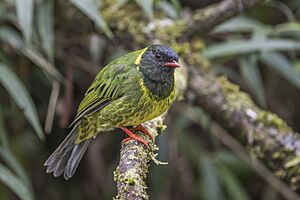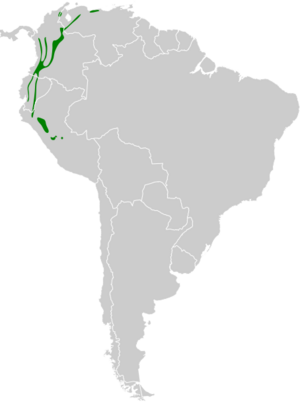Green-and-black fruiteater facts for kids
Quick facts for kids Green-and-black fruiteater |
|
|---|---|
 |
|
| Male P. r. riefferii, Colombia | |
| Conservation status | |
| Scientific classification |
|
| Kingdom: | Animalia |
| Phylum: | Chordata |
| Class: | Aves |
| Order: | Passeriformes |
| Family: | Cotingidae |
| Genus: | Pipreola |
| Species: |
P. riefferii
|
| Binomial name | |
| Pipreola riefferii (Boissonneau, 1840)
|
|
 |
|
| Script error: The function "autoWithCaption" does not exist. | |
Script error: No such module "Check for conflicting parameters".
The green-and-black fruiteater (Pipreola riefferii) is a cool species of bird. It is part of the Cotingidae bird family. You can find this bird in several South American countries. These include Colombia, Ecuador, Peru, and Venezuela. It loves to live in wet mountain forests. This bird is not considered endangered. This is because it has a wide range and a good population size.
What Does It Look Like?
The green-and-black fruiteater is a plump, strong bird. It grows to be about 18 cm (7 in) long. That's about the length of a small ruler!
The adult male bird has a black head, throat, and chest. These black parts have a shiny green color. Its upper body is a pretty mid-green. The tips of its wing feathers are light colored.
There is a bright yellow band around its dark chest. The rest of its belly is yellowish. It often has green spots or streaks there.
The female bird looks similar to the male. But she has green areas where the male has black. She also does not have the yellow band around her neck.
Both male and female birds have reddish-brown eyes. Their legs and beaks are orangish-red.
The song of this bird is high-pitched. It sounds like "ts-s-s-s-s-s-s". This sound lasts for a few seconds. It often slows down and gets quieter as it finishes.
Where Does It Live?
The green-and-black fruiteater lives in South America. It is found in the lower and middle parts of the Andes mountains. Its home stretches from southern Venezuela to northern Peru. It lives at heights between 1,500 and 2,700 m (4,900 and 8,900 ft) above sea level. This bird is often seen in small groups. This is different from some other fruiteater birds.
Is It Safe?
The green-and-black fruiteater is not very common. However, it lives across a very large area. We don't know the exact number of birds. But their population seems to be steady. The International Union for Conservation of Nature (IUCN) checks on animals. They say this bird is of "least concern". This means it is not currently at risk of disappearing.
 | Audre Lorde |
 | John Berry Meachum |
 | Ferdinand Lee Barnett |


